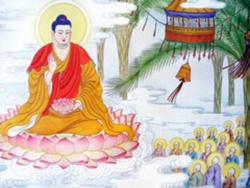Difference between revisions of "Four fearlessnesses"
Jump to navigation
Jump to search
([[]]) |
|||
| Line 2: | Line 2: | ||
[[four fearlessnesses]] | [[four fearlessnesses]] | ||
| − | [ | + | [[[四無所畏]]・[[四無畏]]] (Jpn [[shi-mushoi]] or [[shi-mui]] ) |
Four types of [[confidence]] possessed by [[Buddhas]] and [[bodhisattvas]]. The [[four fearlessnesses]] of a [[Buddha]] are distinct from those of [[bodhisattvas]]. | Four types of [[confidence]] possessed by [[Buddhas]] and [[bodhisattvas]]. The [[four fearlessnesses]] of a [[Buddha]] are distinct from those of [[bodhisattvas]]. | ||
| Line 8: | Line 8: | ||
The [[four fearlessnesses]] of a [[Buddha]] are | The [[four fearlessnesses]] of a [[Buddha]] are | ||
| − | :(1) fearlessness in declaring oneself to be [[enlightened]] to the [[truth]] of all [[phenomena]], | + | :(1) [[fearlessness]] in declaring oneself to be [[enlightened]] to the [[truth]] of all [[phenomena]], |
| − | :(2) fearlessness in proclaiming oneself to have extinguished all [[desires]] and [[illusions]], | + | :(2) [[fearlessness]] in proclaiming oneself to have extinguished all [[desires]] and [[illusions]], |
| − | :(3) fearlessness in proclaiming oneself to have elucidated the obstacles to [[Buddhist]] practice and [[enlightenment]], and | + | :(3) [[fearlessness]] in proclaiming oneself to have elucidated the obstacles to [[Buddhist]] practice and [[enlightenment]], and |
| − | :(4) fearlessness in declaring oneself to have clarified the way of [[liberation]] from the [[world]] of [[suffering]], and thus the way of attaining [[emancipation]]. | + | :(4) [[fearlessness]] in declaring oneself to have clarified the way of [[liberation]] from the [[world]] of [[suffering]], and thus the way of attaining [[emancipation]]. |
The [[four fearlessnesses]] of the [[bodhisattva]] are | The [[four fearlessnesses]] of the [[bodhisattva]] are | ||
| − | :(1) fearlessness in continually memorizing the [[Buddhist teachings]], and in expounding the meaning of these teachings, | + | :(1) [[fearlessness]] in continually memorizing the [[Buddhist teachings]], and in expounding the meaning of these teachings, |
| − | :(2) fearlessness in perceiving the people's inherent capacities, and in expounding the teachings according to those capacities, | + | :(2) [[fearlessness]] in perceiving the people's inherent capacities, and in expounding the teachings according to those capacities, |
| − | :(3) fearlessness in resolving the people's [[doubts]], and | + | :(3) [[fearlessness]] in resolving the people's [[doubts]], and |
| − | :(4) fearlessness in answering any question. | + | :(4) [[fearlessness]] in answering any question. |
| − | The term fearlessness derives from the [[Sanskrit]] word [[vaisharadya]], and here implies dauntless courage and unwavering [[confidence]]; it is regarded as one of the [[virtues]] of [[Buddhas]] and [[bodhisattvas]]. | + | The term [[fearlessness]] derives from the [[Sanskrit]] word [[vaisharadya]], and here implies dauntless {{Wiki|courage}} and unwavering [[confidence]]; it is regarded as one of the [[virtues]] of [[Buddhas]] and [[bodhisattvas]]. |
{{R}} | {{R}} | ||
Revision as of 17:46, 25 August 2013
[[[四無所畏]]・四無畏] (Jpn shi-mushoi or shi-mui )
Four types of confidence possessed by Buddhas and bodhisattvas. The four fearlessnesses of a Buddha are distinct from those of bodhisattvas.
The four fearlessnesses of a Buddha are
- (1) fearlessness in declaring oneself to be enlightened to the truth of all phenomena,
- (2) fearlessness in proclaiming oneself to have extinguished all desires and illusions,
- (3) fearlessness in proclaiming oneself to have elucidated the obstacles to Buddhist practice and enlightenment, and
- (4) fearlessness in declaring oneself to have clarified the way of liberation from the world of suffering, and thus the way of attaining emancipation.
The four fearlessnesses of the bodhisattva are
- (1) fearlessness in continually memorizing the Buddhist teachings, and in expounding the meaning of these teachings,
- (2) fearlessness in perceiving the people's inherent capacities, and in expounding the teachings according to those capacities,
- (3) fearlessness in resolving the people's doubts, and
- (4) fearlessness in answering any question.
The term fearlessness derives from the Sanskrit word vaisharadya, and here implies dauntless courage and unwavering confidence; it is regarded as one of the virtues of Buddhas and bodhisattvas.
